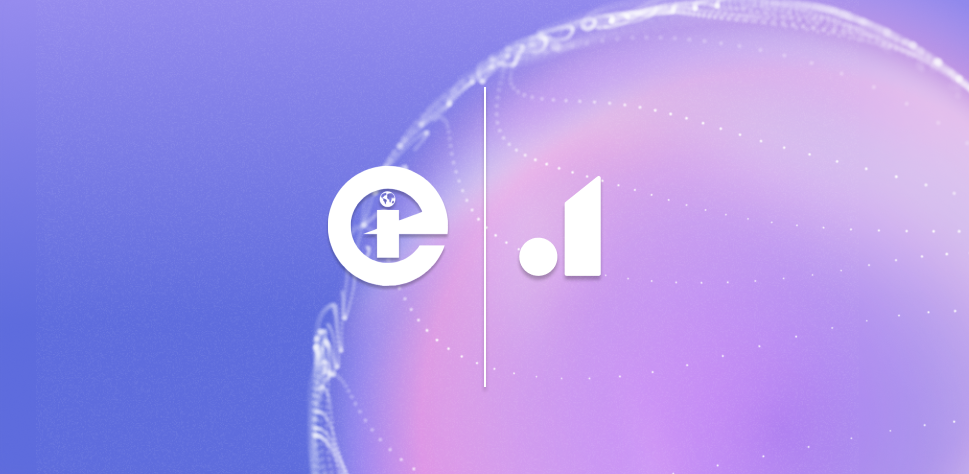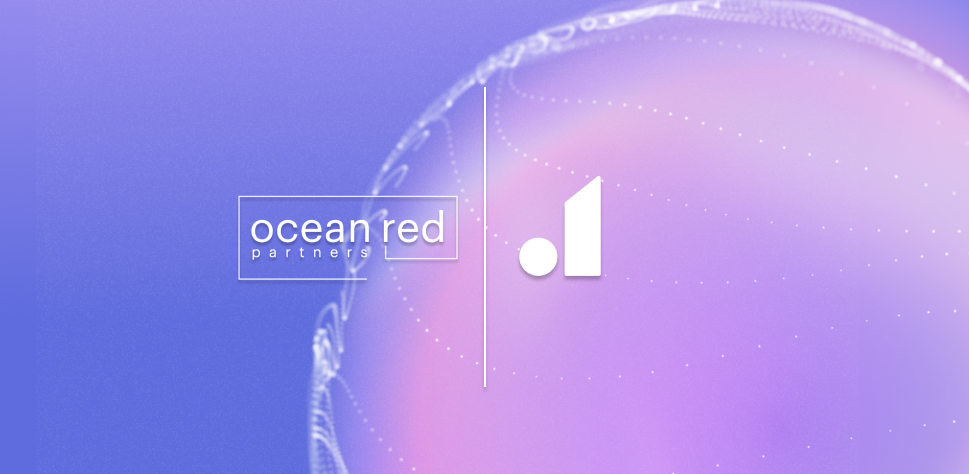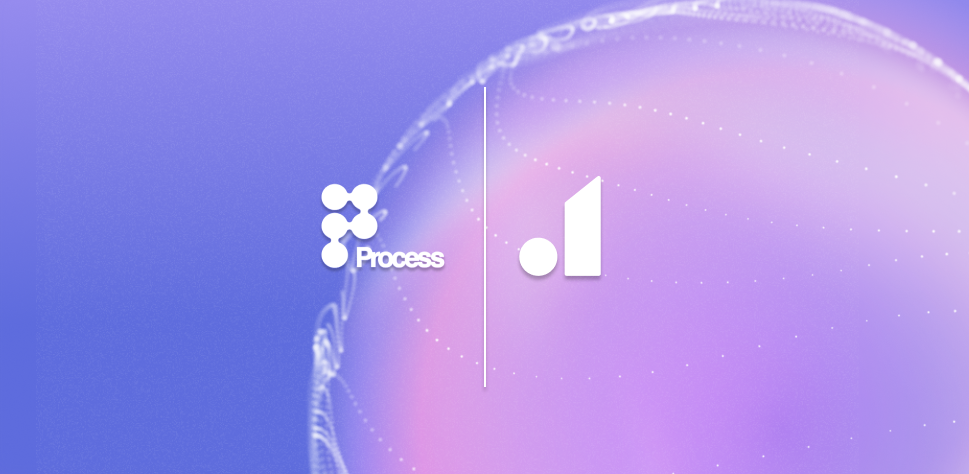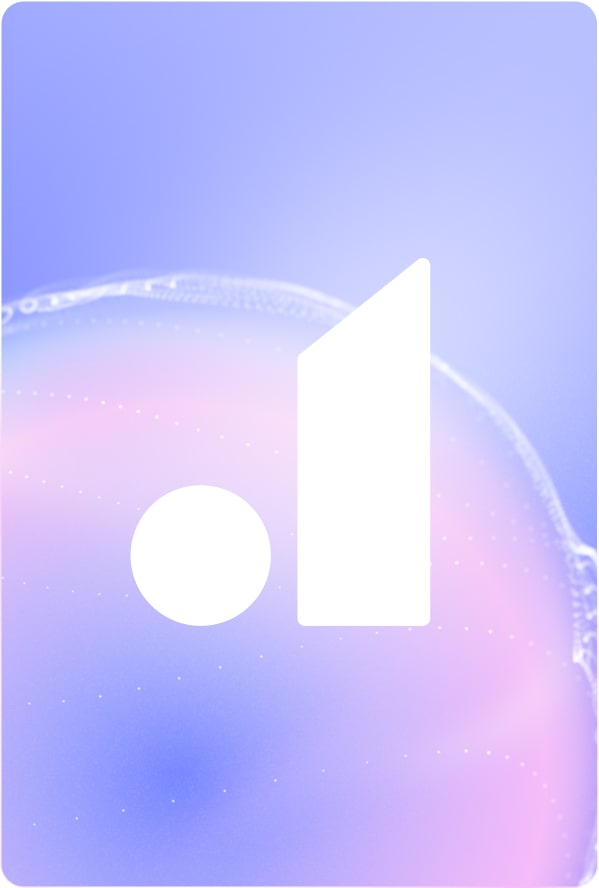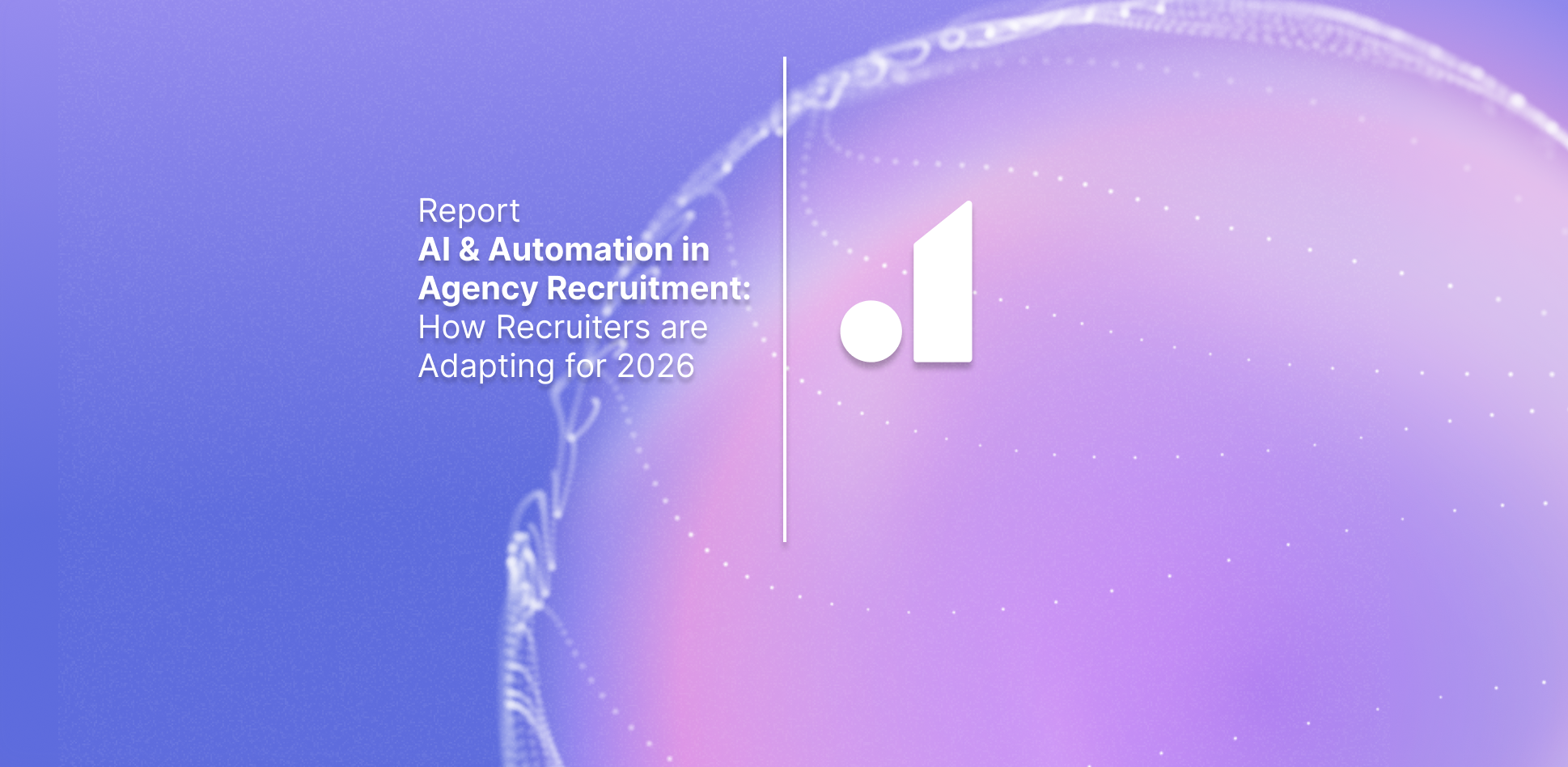
// Reports
AI & Automation in Agency Recruitment Statistics: How Recruiters are Adapting for 2026
23/10/2025
12 MIN
AI in agency recruitment is shifting from early testing to everyday use. What once felt experimental is now becoming part of standard workflows in many agencies.
With increased competition and rising client expectations, recruiters are turning to AI and automation to save time and improve performance. Tools that handle sourcing, outreach, scheduling, and data entry are helping recruiters focus more on high-value tasks.
This report is based on original research by Atlas, drawing on survey responses from hundreds of agency recruiters. It reveals how teams are adopting AI, what tools they’re using, and what they expect from the technology heading into 2026.
1. 51.67% of Recruiters Say AI Has Had a Strongly Positive Impact on Their Productivity
Over half of agency recruiters (51.67%) say AI has had a strongly positive impact on their productivity. Another 41.67% report a slightly positive effect, suggesting that AI is making a real difference in daily workflows, not just promising future gains.
With more than 93% of agency recruiters reporting a positive impact overall, it’s clear that AI is already delivering tangible results across the recruitment lifecycle. Recruiters using AI effectively are able to work faster while freeing up time for high-value interactions and more strategic activities.
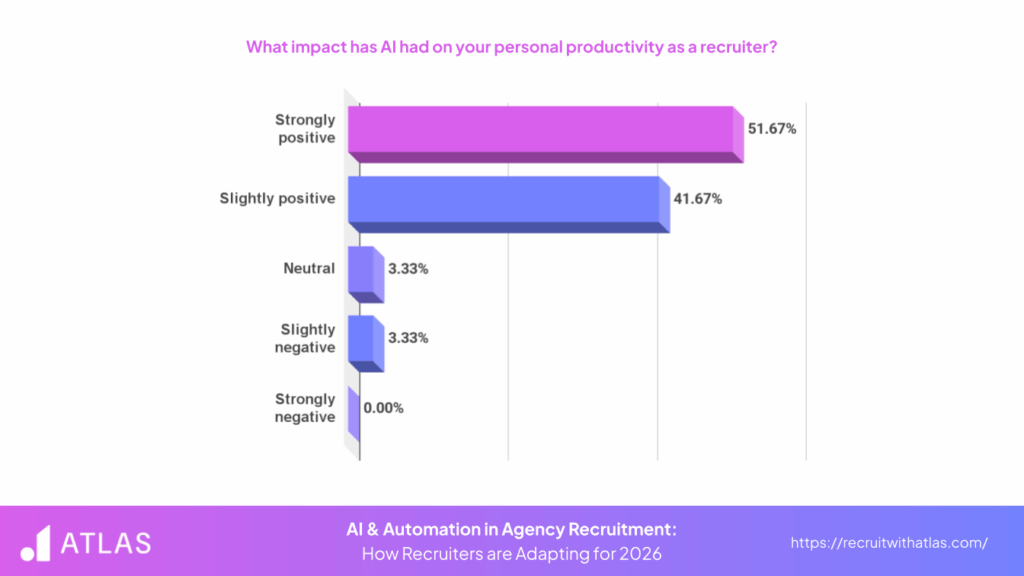
2. 41.7% of Recruiters Have Been Using AI Tools for 6 to 12 Months
The most common adoption window for AI recruiting tools is between 6 and 12 months, reported by 41.7% of recruiters. This suggests that many agencies are still in the early stages of integrating AI, testing its impact across sourcing, engagement, and internal processes. Another 28.3% said they’ve been using AI for less than 6 months, showing that momentum around adoption is still building.
Only 10% of recruiters have used AI tools for more than 2 years. This relatively small group represents the earliest adopters, likely to have gone through more trial and error in figuring out where AI adds the most value. These findings show that while adoption is accelerating, most recruiters are still learning how to fully embed AI into their workflows.
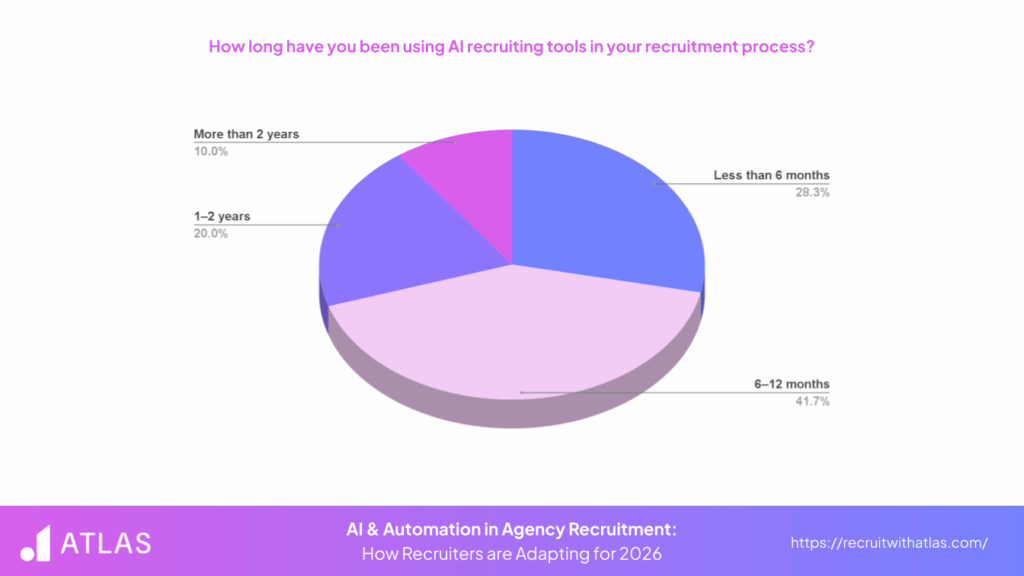
3. Most Recruiters Are Gaining Back 5 to 10 Hours Weekly with AI
Recruiters are seeing meaningful time savings from AI, with 28.33% reporting that these tools save them between 5 and 10 hours per week. This is a strong signal that AI is doing more than automating surface-level tasks. It is helping remove real bottlenecks across sourcing, engagement, and admin-heavy work. Another 26.67% say they save between 1 and 3 hours weekly, showing that even modest use of AI can make a difference.
Only 13.33% of recruiters report saving more than 10 hours per week. This suggests that deeper integration or more advanced use cases could unlock greater time savings. At the same time, 21.67% estimate their weekly savings fall in the 3 to 5 hour range. These hours create space in the week for more strategic activity, stronger candidate relationships, and faster placements.
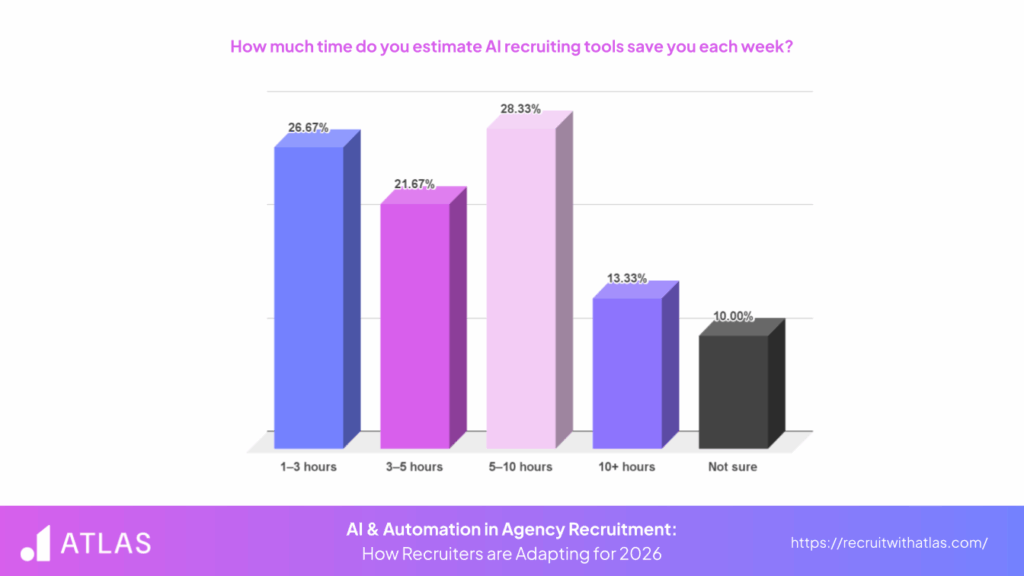
4. 46.7% of Recruiters Say 25-50% of Their Workflow Is Automated with AI
AI is playing a growing role in day-to-day recruitment workflows. The largest group of respondents (46.7%) say that 25-50% of their recruitment process is now automated with AI tools. This level of adoption shows that AI is moving beyond isolated tasks and becoming embedded in core activities like sourcing, screening, and follow-ups.
Another 45% of recruiters say less than 25% of their workflow is currently automated, highlighting that many are still in the early phases of adoption. Only 8.3% report automation levels between 50-75%, showing that full-scale AI-driven recruiting still remains rare. These results suggest that while momentum is building, most teams are still scaling up their use of AI gradually.
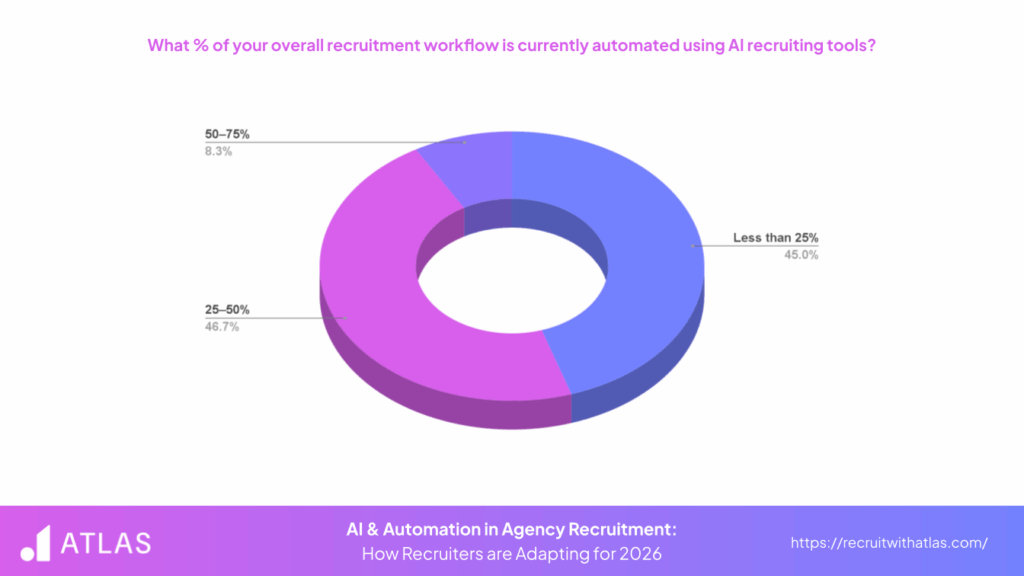
5. AI is Helping 41.67% of Recruiters Place Candidates More Quickly
AI tools are having a clear impact on how quickly recruiters can make placements. The largest group of respondents (41.67%) say their placement speed has become moderately faster since using AI. This improvement reflects the time saved on tasks like outreach, screening, and interview coordination, which often delay progress in the recruitment cycle.
Only 6.67% report significantly faster placement times. While that group is small, it indicates that with deeper or more strategic AI use, the speed benefits can be even more substantial.
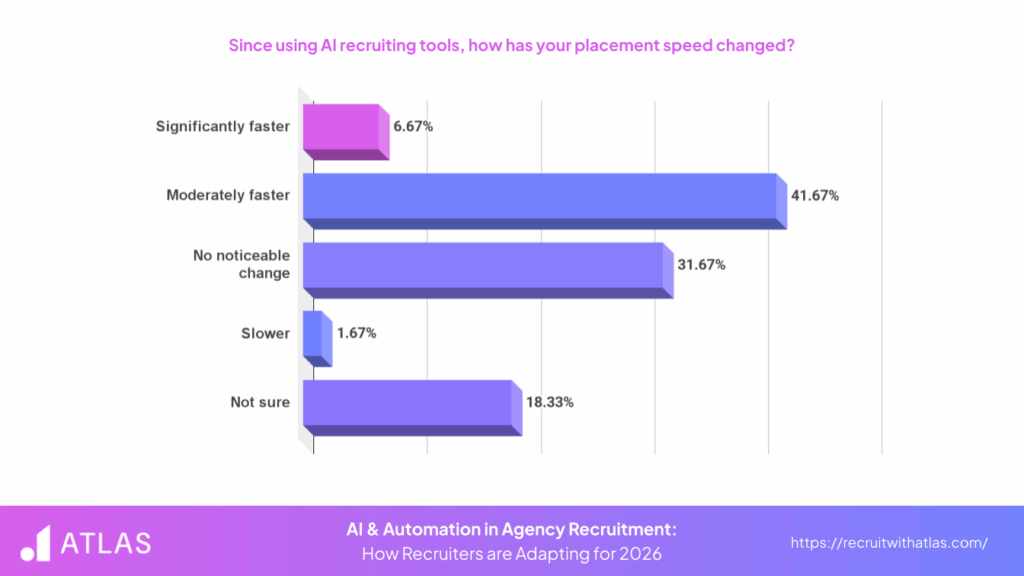
6. AI Still Plays a Limited Role in Most Candidate Placements
Half of recruiters (50%) say that less than 25% of their placements involve candidates who were surfaced or influenced by AI tools. This shows that while AI is gaining ground in recruiter workflows, its impact on the final hiring outcome remains relatively limited for many. It may also reflect how much of the recruiting process still relies on human judgment and relationship-building.
Another 25% of recruiters say that between 25-50% of their placements involve AI-sourced candidates. At the other end of the scale, only 3.33% report that more than 75% of their placements are influenced by AI. These numbers suggest there’s still significant room for growth in how AI is used to identify and engage candidates who ultimately get hired.
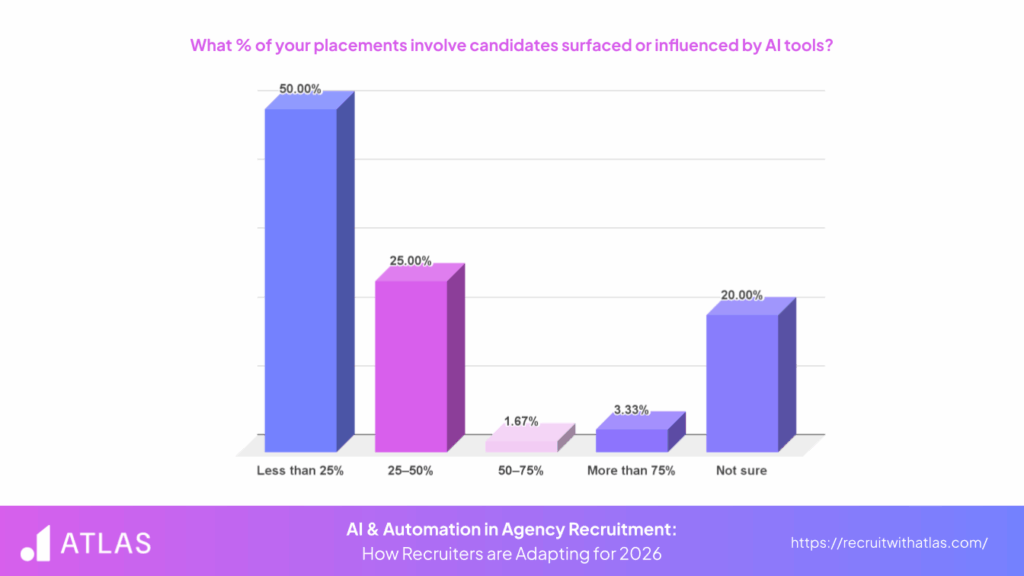
7. 65% of Recruiters Say AI is a Game-Changer for the Industry
The majority of recruiters (65%) view AI as a game-changer for the industry. This strong endorsement reflects the value recruiters are already experiencing from AI tools, whether through increased productivity, faster placements, or reduced admin. The enthusiasm signals that AI is not being seen as a passing trend, but as a foundational shift in how agency recruiters operate.
Another 25% describe AI as helpful but not essential, showing that some still see it as a nice-to-have rather than a core part of their workflow. Only 5% believe AI is overhyped. This low level of scepticism, combined with such strong positive sentiment, suggests that as tools continue to mature, adoption and trust in AI will likely deepen across the agency recruitment space.
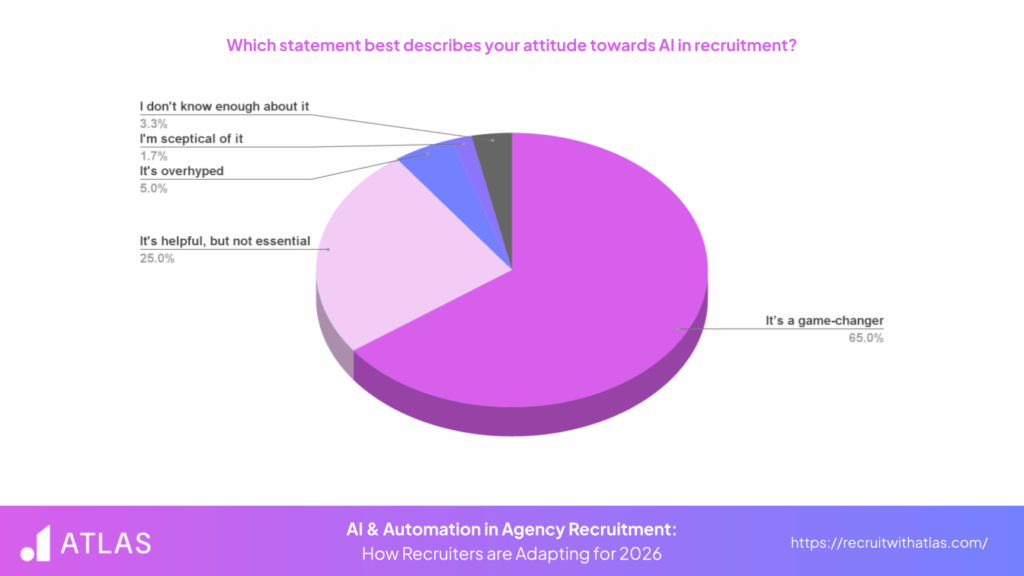
8. 38.33% of Recruiters Use AI Primarily to Reduce Admin
Understanding what motivates recruiters to adopt AI helps reveal where the biggest pain points lie in the recruitment workflow. The top reason recruiters use AI tools is to reduce admin, selected by 38.33% of respondents.
This aligns with one of the most consistent themes across the report: AI’s role in removing repetitive, time-consuming tasks. Close behind, 35% of recruiters said their main reason for using AI is to save time, reinforcing the need for tools that give them more room to focus on candidate engagement and deal-making.
One in five recruiters (20%) use AI to gain a competitive edge. This shows that beyond efficiency, some agency professionals are looking to AI for strategic advantage in a fast-moving market. These results show that for most recruiters, AI adoption is being driven by a need to streamline the operational load.
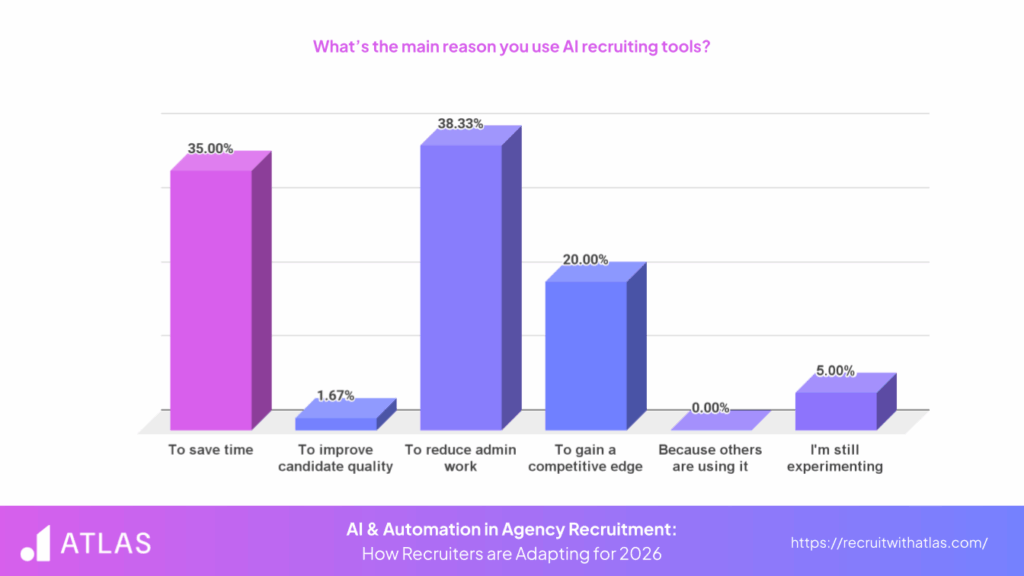
9. 85% of Recruiters Use AI to Automate Admin Tasks
To get a holistic overview of how AI is shaping recruiter workflows, it’s essential to look at the specific tasks being automated. It’s why we asked agency recruiters a multiple-choice question about what kind of work they’re automating. Admin tasks lead by a wide margin, with 85% of recruiters using AI to handle updates in their ATS or CRM, manage notes, or complete similar backend processes.
Messaging and outreach come next at 60%, showing strong interest in automating top-of-funnel engagement. Resume screening is automated by 31.67% of respondents, while 26.67% are using AI for candidate sourcing.
Categories like reporting and analytics (38.33%) and interview scheduling (21.67%) also show meaningful adoption, but the trend is clear: recruiters are starting with the areas that consume time without contributing directly to candidate relationships or placements.
Other responses include note-taking, job brief documentation preparation, and candidate bio research. These results reinforce the idea that AI is being used to clear the path for more strategic and revenue-generating work.
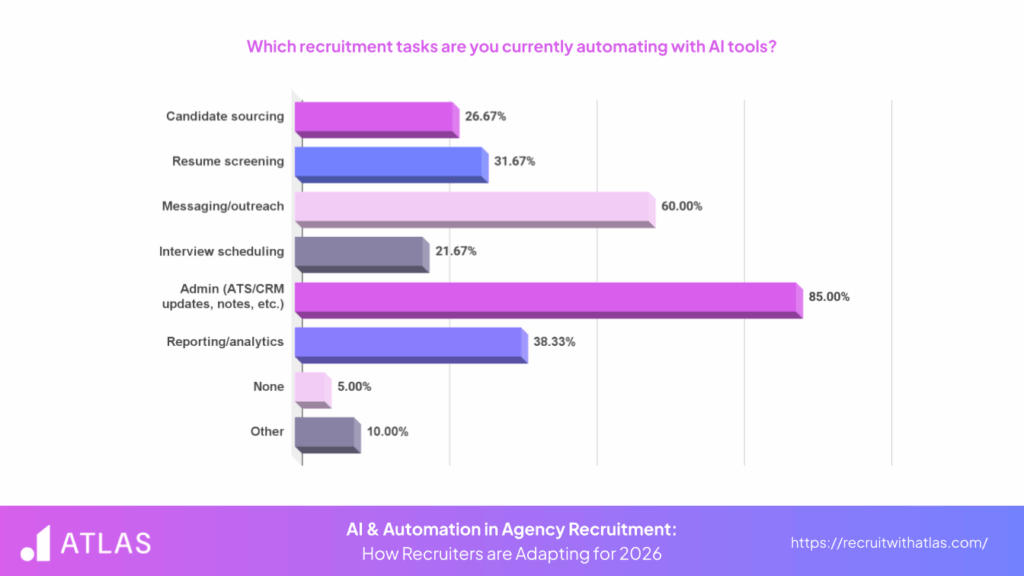
10. 43.3% of Recruiters Believe AI Will Replace Major Parts of Their Role
A significant 43.3% of recruiters believe AI will replace major parts of the recruiter’s role in the near future. This suggests that many professionals are preparing for a shift in how value is delivered by moving away from executional tasks toward strategic influence. Another 31.7% expect AI to replace only minor tasks, indicating a more cautious view of automation’s reach.
In contrast, 18.3% of respondents believe AI will only assist rather than replace human efforts. This group sees the technology as supportive rather than disruptive. A smaller 6.7% remain unsure. These views show that while opinions vary, the majority of recruiters anticipate meaningful change, and many are already thinking about how to adapt their roles for the future.
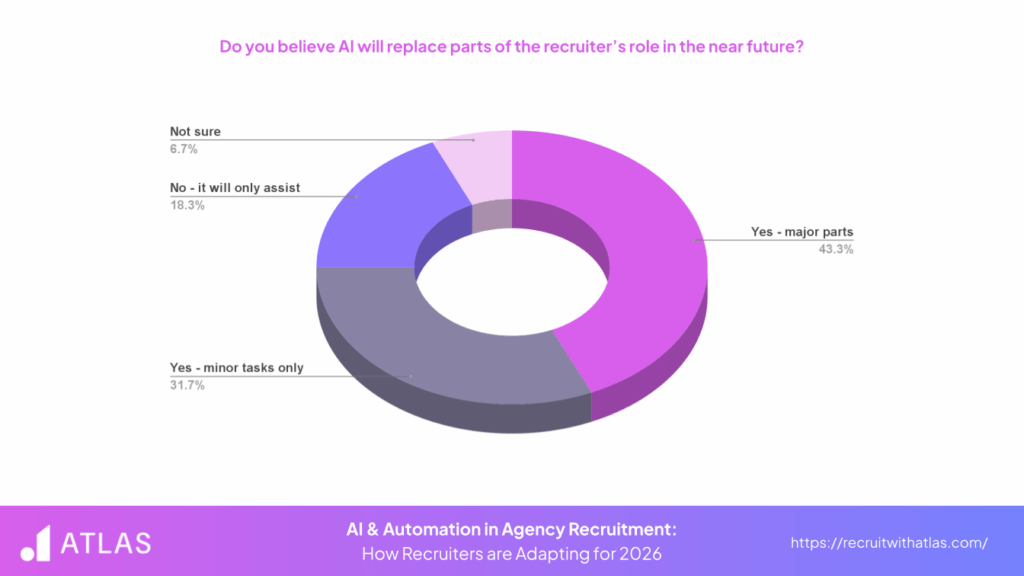
11. Recruiters Struggle Most with AI Setup and Trust in the Outputs
To better understand what might slow down AI adoption in recruitment, we asked recruiters about their biggest challenges. These insights help reveal the practical friction points that teams face when bringing new tools into daily operations.
Integration and setup topped the list, with 28.33% of recruiters citing it as their biggest obstacle. Trusting the outputs came in close behind at 26.67%, highlighting a need for more transparency and confidence in AI-driven recommendations.
Choosing the right tools was a major challenge for 23.33% of respondents, reflecting a crowded and fast-moving vendor landscape. Interestingly, only 8.33% of recruiters said they haven’t faced any major challenges, which shows that even as adoption grows, most teams are still navigating some form of technical or operational barrier. Others cited cost as a potential bottleneck in adopting AI.
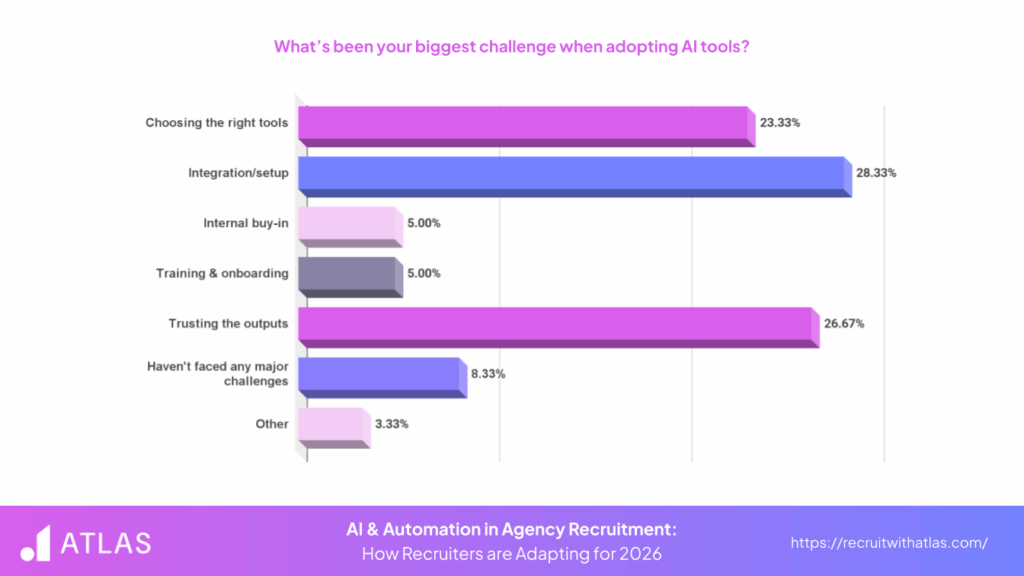
12. AI Adoption is Set to Accelerate, with 40% Expecting Major Growth
A full 40% of recruiters say they expect their agency’s use of AI to increase significantly in the next 12 months. This level of projected growth reflects increasing trust, broader adoption, and a clear appetite for scaling automation. Another 46.7% expect usage to increase slightly, showing that for most teams, AI is not just a short-term experiment but part of a longer-term shift in how work gets done.
Only 8.3% believe usage will stay the same, and just 5% are unsure. With nearly 9 in 10 recruiters anticipating growth, the data indicates that AI will continue to reshape agency recruitment throughout 2026.
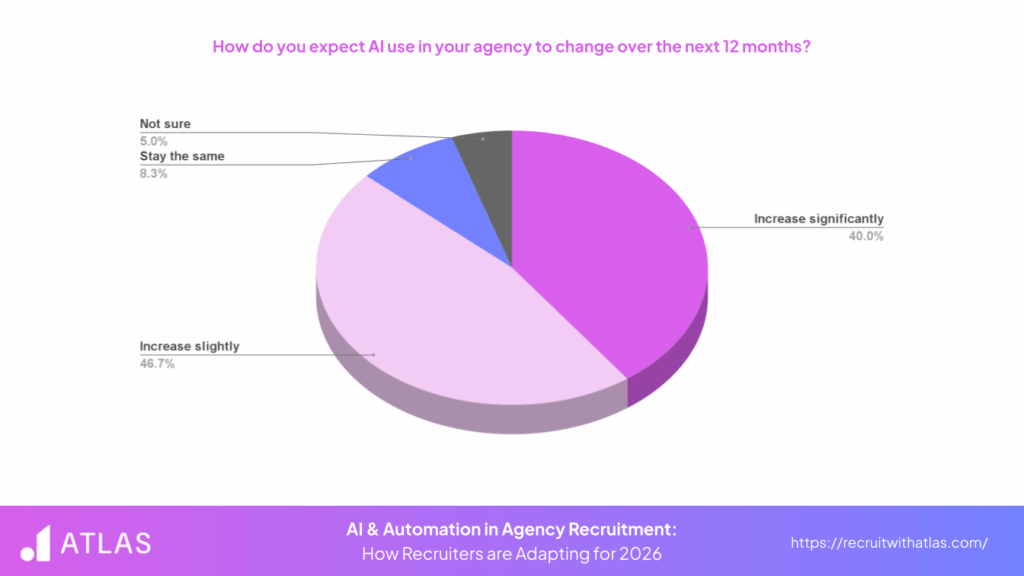
13. 25.81% of Recruiters Still Want Candidate Sourcing to Be Better Automated
Even with the rising adoption of AI, some recruitment tasks still remain manual. Candidate sourcing and discovery was the top unmet need, chosen by 25.81% of recruiters. While many AI tools promise to streamline sourcing, this result suggests that recruiters are not yet fully satisfied with the results or ease of use. Workflow efficiency followed closely at 22.58%, showing a desire for tools that better coordinate tasks across the recruitment cycle.
Scheduling and interview automation was selected by 16.13% of recruiters, indicating that calendar coordination continues to eat into recruiter time. Smaller but still notable gaps were reported in areas like contextual intelligence and tool connectivity (both at 12.9%). These insights point to a growing expectation for AI to go beyond task automation and deliver more seamless, integrated experiences.
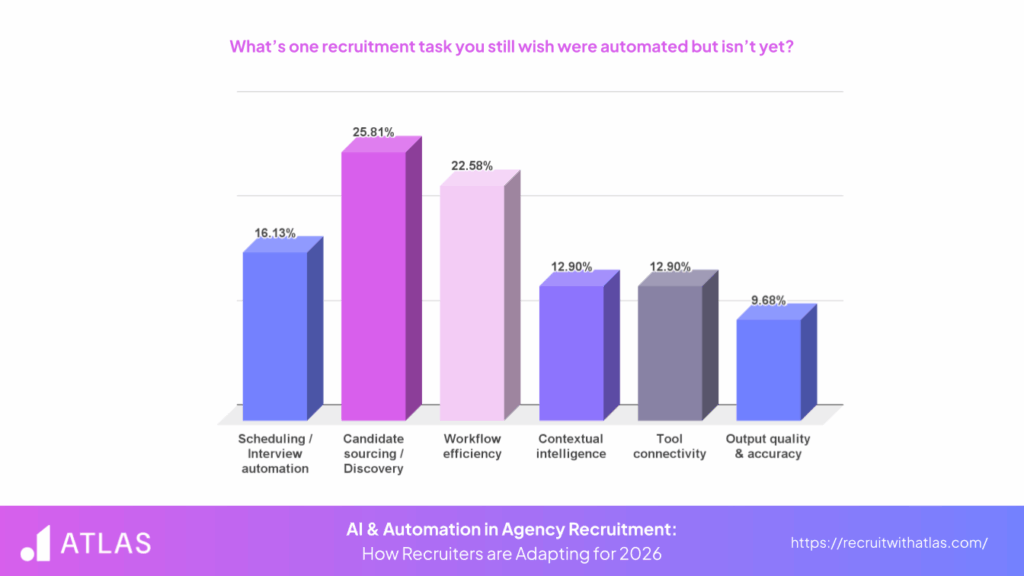
14. What Advice Would You Give to Other Agencies Considering AI Recruiting Tools?
To wrap up our report, we asked agency recruiters about their takes on AI adoption. After months and years of using AI in recruitment, what are the best pieces of advice they’d give to someone considering these tools right now? Here are some of the highlights:
Think about your workflow and your USP first, then get the tech to enable that. Don’t buy AI for the features. It could harm what makes your agency different.
It will definitely save time, but don’t expect it to replace the most skilled part of your role. Connecting opportunity still matters most.
Start small when implementing AI. Recruiters need to see quick wins before they’ll invest the time to learn and adopt new tools.
Identify the pain points in your process first, then explore where AI could help. Don’t start with the tech. Start with the problem.
Grit your teeth for half a day to save a month of time. Learn to use AI effectively and with integrity. There’s a lot of noise out there, so take your time finding the right tool.
As AI Reshapes Recruitment, Atlas Helps Agencies Stay Ahead
The data is clear: AI is no longer experimental in agency recruitment. Most recruiters are already using AI tools to reduce admin, save time, and accelerate workflows. Adoption is growing, expectations are rising, and many recruiters believe AI will take over major parts of the role in the near future.
At the same time, the report highlights real challenges, from tool integration and setup to building trust in AI outputs. Recruiters are asking for better sourcing, smoother workflows, and smarter automation that fits their day-to-day operations.
Take the next step to future-proof your desk
Atlas is built to meet that need. Designed specifically for agency recruiters, it automates repetitive tasks, integrates cleanly with your existing systems, and evolves with your business. Whether you are a boutique firm or a large-scale agency, Atlas helps you focus on what really matters: building relationships, delivering value, and staying ahead as recruitment continues to change.



